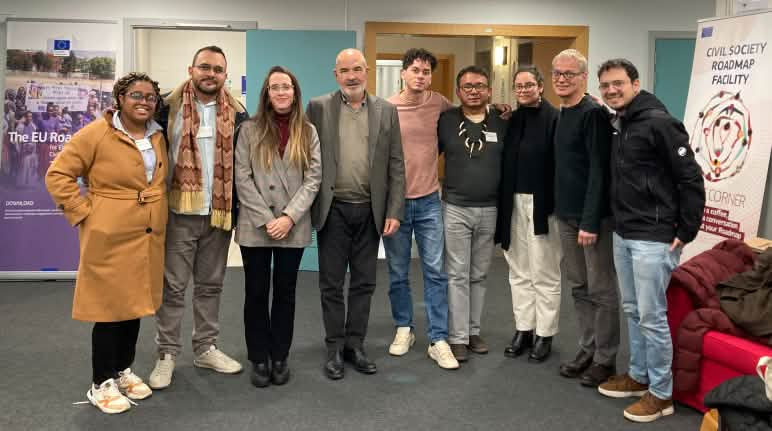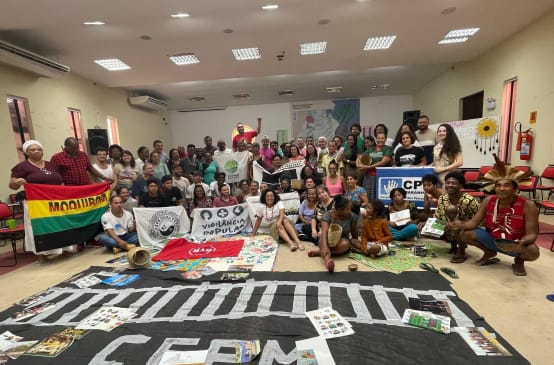No EU money for GPM rail and port project in Brazil!
Together with our partner organizations from Brazil, we were in Brussels at the end of November to stop EU funding for a planned rail and port project in the Amazon rainforest in Brazil – with success! Our letter and visit were key to the European Commission’s decision not to fund the project.
For five months we had been trying to get in touch with the European Commission. Now, at the end of November 2024, the time had finally come: Eight of us – including five Brazilian activists – are sitting in a conference room at the European Commission in Brussels.
The issue: the possible financing of a planned freight railway and port project in the Amazon region by the EU, which Rainforest Rescue has been campaigning against together with Brazilian partner organizations for almost two years. In Brazil, the association Justiça nos Trilhos (Justice on Rails) is leading the campaign.
In the state of Maranhão, three Portuguese businessmen are planning to build a 520-kilometer private freight railway, an industrial zone and an export port on the Atlantic coast. Their project, Grão-Pará Maranhao (GPM), is designed to boost exports of agricultural and mining products: soy, corn, iron ore and hydrogen.
The project and the planned expansion of cultivation and extraction of raw materials pose an enormous threat to Brazil’s nature, the Amazon rainforest, the neighboring savannahs of the Cerrado and the Indigenous and traditional communities living there.
Clearing the rainforest with EU money?
In March of this year, it was announced that GPM was seeking funding from the EU’s Global Gateway Initiative, the European counterpart to China’s New Silk Road Initiative. The European Commission wants to spend 300 billion euros on infrastructure projects around the world to help European industry compete with China for access to raw materials and markets. Such projects include ports, railways, roads, power plants, electricity, water and data lines. Education and health systems will also be supported, with banks, investors and corporations providing much of the money.
We had heard from a reliable source that there had been three presentations of the GPM project in Brussels. One of them took place in May during a meeting of EU Commissioners Jutta Urpilainen and Maroš Šefčovič with Brazilian governors at the European Commission headquarters. So is a decision on GPM funding imminent, or has it already been made? We investigated this question.
European Commission ignores requests
For five months, we wrote to various officials at the European Commission, including President Ursula von der Leyen. In our letters, we requested a meeting and demanded that the GPM project not be funded under any circumstances. We detailed the serious social and environmental impacts of the project.
We received no response from the EU, not even an acknowledgement of receipt of our letters. It was not until the end of October that we were able to arrange a telephone meeting with the EU Commission. We then made further appointments with members of the EU Parliament and meetings with Belgian development organizations – and have now traveled to Brussels. There we met with Paolo Toselli and Julia Fernandez-Puertas, two officials from the EU Commission’s Directorate-General for International Partnerships:

“The GPM operators presented themselves as experts, they knew very well what the EU was looking for, projects to produce and export hydrogen,” explained Paolo Toselli. “They said they had an incredible place in Brazil to produce green hydrogen with renewable energy at the lowest cost in the world.”
The EU had presented GPM as a flagship project in 2023, Toselli continued. But then it became clear that the GPM operators had no documentation and that their project was nothing more than a promotional presentation. “We presented this to the European Investment Bank (EIB),” the EU official continued. The Bank’s response: The operators had no money of their own, there were no environmental and social studies, and the Bank could not possibly support such a thing.
Deutsche Bahn approaches European Commission about GPM
Toselli says he has not heard from GPM or Deutsche Bahn (DB) in about four months. DB initiated contact with the European Commission on behalf of GPM two years ago and was present at GPM’s presentations in Brussels.
Rainforest Rescue has been protesting DB’s involvement in the project in Brazil for months with the petition “Brazil: Keep Deutsche Bahn out of Amazonia”. More than 63,000 people have signed it to date. The petition was prompted by a Memorandum of Understanding (MoU) that the DB subsidiary DB E.C.O. Group signed with GPM at the beginning of 2023 regarding the joint project development and subsequent operation of the railway.

Justiça nos Trilhos, Misereor and Rainforest Rescue jointly filed a complaint with DB in May 2024 and demonstrated in front of DB headquarters in Berlin. However, DB CEO Dr. Richard Lutz and the complaints office played down their responsibility, stating “that the DB E.C.O. Group has only expressed a general interest in this matter”.
We now hear from the European Commission that DB, which is wholly owned by the German state, has been in contact with the Commission regarding the possible financing of the project. DB is obviously aware of the implications of the GPM project, because shortly after our protest and complaint in Berlin, it quietly deleted its press release on the GPM project in Brazil from its website. However, the press release can still be found in the WayBackMachine Internet Archive.
Global Gateway’s flagship projects are not real
Less than two weeks after our visit to Brussels, the EU published a list of Global Gateway flagship projects for 2025. For Brazil, “the development and construction of a port in Maranhão with the aim of creating a green and digital corridor to Europe” is listed in the transport sector.
EU official Toselli explained by phone: “These are start-ups. The projects are at very early stages and there is no support, no social and environmental studies for them. They are announced by the European Commission as real projects, but they are not.”
Not a single Global Gateway project has been funded in Brazil, says Toselli, noting that it was good that we wrote our letters to the EU and came to Brussels. Global Gateway urgently needs to improve communication, at the latest by March 2025, when an EU-Brazil summit is planned.
We are disappointed and shocked. Is this how the European Commission promotes itself and conducts international policy – with such empty promises? Deceiving the public in this manner is totally irresponsible and unprofessional. Since September 2022, the European Commission, together with the EU member states, has presented over 220 flagship projects to be funded through Global Gateway, according to the German Foreign Office.
We wonder how many of these projects are real and will actually be funded? Who can you contact at the European Commission if you have questions about the projects? Why doesn’t the European Commission respond to well-founded written inquiries, and why is there no complaints office for Global Gateway projects?
We asked EU official Toselli for a written response from the European Commission regarding the GPM rail and port project in the Amazon rainforest. Toselli explained over the phone: “I drafted a possible statement on the GPM project, and my superiors asked me to make some corrections, minor changes, but the EU delegation in Brazil did not agree with them, and they were also upset that I met with you.”
In other words, there will be no written answer from the EU. But we will not give up and will continue to pursue the Global Gateway Initiative.
Rainforest Rescue, Feb. 24, 2023. Brazil: Rail and port construction with German involvement threatens people and nature: https://www.rainforest-rescue.org/updates/11250/brazil-rail-and-port-construction-with-german-involvement-threatens-people-and-nature
O Informante, Mar. 24, 2024. José Reinaldo destaca importância histórica da possibilidade do primeiro financiamento apoiado pela União Europeia: https://portaloinformante.com.br/noticias/2024/03/jose-reinaldo-destaca-importancia-historica-da-possibilidade-do-primeiro-financiamento-apoiado-pela-uniao-europeia/
European Commission, undated. Global Gateway: https://commission.europa.eu/strategy-and-policy/priorities-2019-2024/stronger-europe-world/global-gateway_de
DB E.C.O. Group, Feb. 3, 2023. Brazil’s multimodal logistics solution for sustainable supply chains: https://web.archive.org/web/20230320184309/https://db-eco.com/de/brasiliens-multimodale-logistiklosung-fur-nachhaltige-versorgungsketten/
Reply from Deutsche Bahn CEO Dr. Richard Lutz dated June 26, 2024: https://www.regenwald.org/files/de/Antwortschreiben-Dr-Lutz-DB-Vorstandsvorsitzender-27-6-24.pdf
DB E.C.O. Group, Feb. 3, 2023. Brazil’s multimodal logistics solution for sustainable supply chains: https://web.archive.org/web/20230320184309/https://db-eco.com/de/brasiliens-multimodale-logistiklosung-fur-nachhaltige-versorgungsketten/
Council of the European Union, Dec. 2, 2024. Global Gateway: Council endorses flagship project list for 2025: https://www.consilium.europa.eu/en/press/press-releases/2024/12/02/global-gateway-council-endorses-flagship-project-list-for-2025/
Council of the European Union, Nov. 22, 2024. Draft proposal for a list of Global Gateway flagship projects for 2025 and for amending the lists of Global Gateway flagship projects for 2023 and 2024: https://data.consilium.europa.eu/doc/document/ST-15281-2024-INIT/en/pdf
German Foreign Office, July 22, 2024. EU Global Gateway: Globale Partnerschaften für demokratische und nachhaltige Standards: https://www.auswaertiges-amt.de/de/aussenpolitik/europa/aussenpolitik/eu-global-gateway-globale-partnerschaften-fuer-demokratische-und-nachhaltige-standards-2606232
This page is available in the following languages:

Brazil: Keep Deutsche Bahn out of Amazonia!
We call on the German government and the state-owned Deutsche Bahn AG not to participate in the destructive GPM project in the Amazon rainforest.

Defending the Amazon against global demand for commodities
Justiça nos Trilhos supports people in the Amazon rainforest who are threatened by the production of raw materials such as soy and iron ore.


